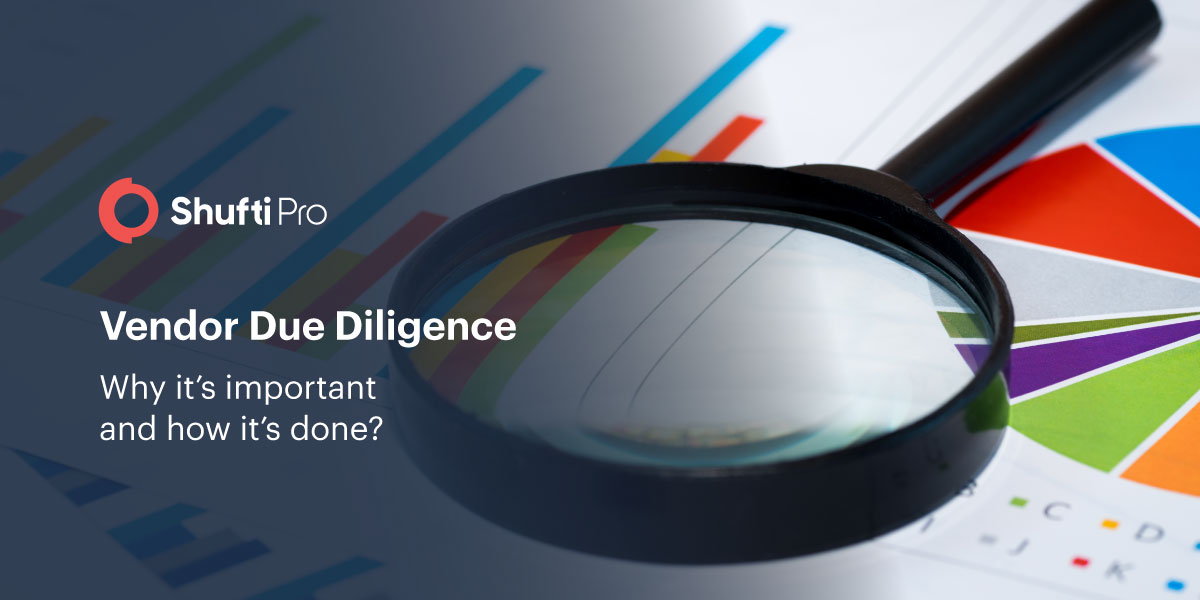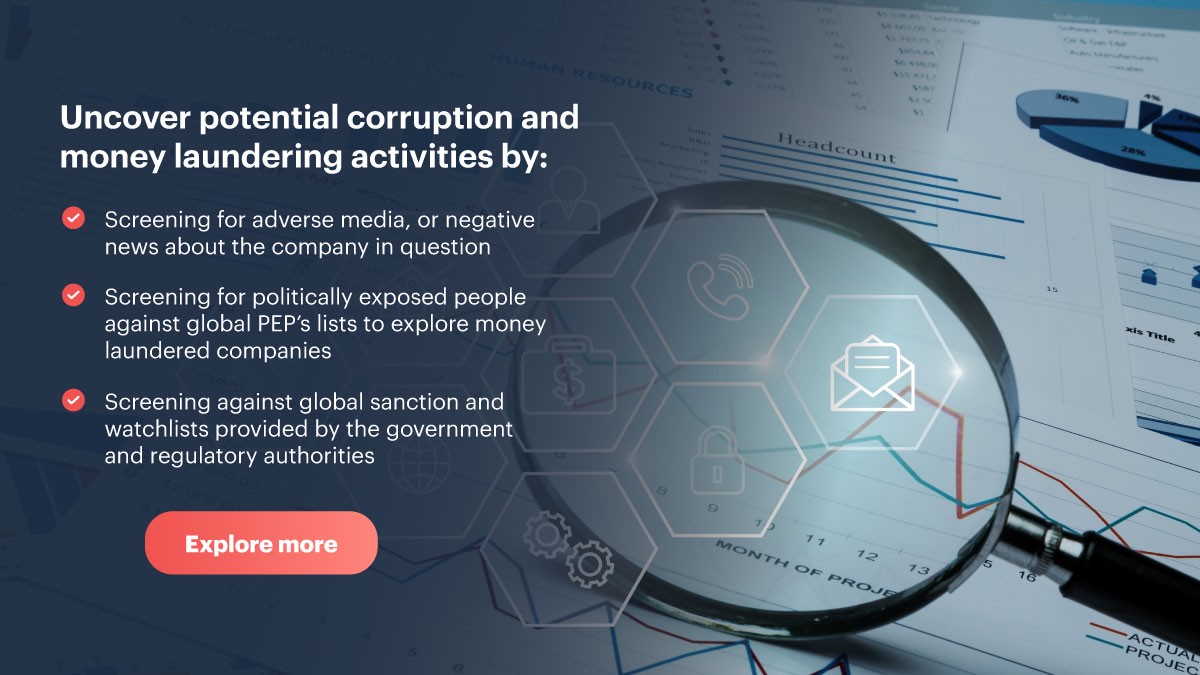Vendor due diligence – Why it’s important and how it’s done?

In today’s ever-changing corporate landscape, businesses are always looking for ways to make their operations as functional as possible for acquiring profits and success altogether. Outsourcing third party vendors to carry out certain tasks is a growing trend across the globe. Apart from saving time, it saves costs too. But as businesses grow, the need for employing third-party operations arises and so do the risks. Therefore, such risks are making companies more vigilant in analyzing and detecting associated threats to safeguard their businesses, clients, consumers, and company sensitive data at all costs. This is where the enhanced vendor due diligence process comes in.
What exactly is vendor due diligence?
Vendor due diligence has become extremely important over the years. The process is carried out when a company aims to acquire, buy shares, or agree to enter into a business relationship for potential partnerships with another company.
Vendor due diligence is usually conducted on the request of the buyers to inquire about the financial prospects, stability, and processes of the company they are attempting to buy. A comprehensive report is developed by the third-party networks and presented to potential buyers and/or investors. But in some cases, it takes place on the request of the seller to address any concerns as well.
Thorough screening helps to eliminate vendor fraud surrounding vendors before the acquisition. Moreover, the vendor due diligence process is considered a crucial part of AML as it indicates that the company you are entering in business with is ethical and compliance risk-free. This helps companies to avoid any financial and reputational harm in the future. So it is beneficial for buyers and sellers both to perform a thorough vendor due diligence process before selling and buying so that financial issues can be rectified before the business is concluded.
Vendor due diligence and AML compliance
Global businesses are always subjected to financial, reputational, and regulatory risks. This is why various regulations including AML (Anti-money laundering) are in place to mitigate partner risks. Companies attract in-depth regulatory scrutiny especially when third parties are involved regardless of the location. Both third parties or companies are legally bound to go through a rigorous vetting process including screening against global sanctions in order to determine the significant risks entities can pose. The SEC claims that Mozido’s founder Michael Liberty had defrauded 200 investors, raising $55M in fundings, in 2018.
Buyers should pay attention to AML obligations before making a purchase because no one wants to be related to a company that is subjected to money laundering in the past.

Why is vendor due diligence important?
The entire business ecosystem is rapidly expanding across borders. Interestingly, corporate partnerships and friendly alliances are in the spotlight. That’s why it is vital to know the vendor you are toiling with is in good standings. Thus, making vendor due diligence a robust solution for successful vendor onboarding and risk assessment. Theranos – a blood-testing startup managed to raise more than $700M for a bogus blood testing technology that didn’t even exist. In the wake of technological disruptions and financial crimes around the world, conducting an extensive due diligence process is worth it.
- Increases prospective buyer’s trust, and confidence which as a result intensifies the possibility of a successful acquisition
- It makes the whole structure and processes of the business in question more transparent
- Allows the seller to identify any risk pertaining to the company’s assets beforehand
- Discovering issues at the initial stages speeds up the entire negotiation process
- An in-depth due diligence report lessens the legal and financial questions from the buyer’s end
- Vendor due diligence enables competitive selling price and increases the financial value
- Potential buyers can save costs otherwise spent on their own investigations
Vendor due diligence process
A comprehensive vendor due diligence process includes the following stages:
Step 1: In the initial stage, the vendor connects with a third party network to conduct due diligence on their account. This happens before the target company’s assets are offered for purchase. The third-party should be unbiased and officially trained to perform the audit.
Step 2: After the audit, the third party is expected to develop and present a draft of the vendor due diligence reports (VDDR). The VDDR is sent to all the relevant parties involved for review. After which sellers permit buyers to conduct their own due diligence.
Step 3: Depending upon the intricate nature of the sale, both parties lead the stages of sale negotiations.
Step 4: After the partnership is concluded, the third party sends the final and complete VDDR to the buyers.
Vendor due diligence Checklist
Basic company information: The first step in the vendor due diligence checklist is gathering the company-specific information. It assures the potential buyer that the target company is legal to operate in its area. Basic target company information can include and is not limited to:
- Geo-location
- Incorporation documents
- Tax number
- Legal status such as risk-free
- Key stakeholders and beneficiaries
- Company structure
- Reliable references
- Business license
Financial information: Checking financial information is one of the most important items for potential buyers to check off the list. It gives buyers a holistic view of the vendor’s financial footing and whether the sellers are financially solvent and paying the taxes or not. If the vendor is not paying the taxes then there are no practical reasons to acquire a company that will run out of business the second it is sold.
The financial information can be fetched by analysing:
- Tax documents
- Balance sheets
- Loans
- Major assets and/ or liabilities
- Compensation structure
Political and reputational risk: It’s not just about vendors but also whom vendors would choose as their third party link for due diligence. For example: choosing an audit firm whose general manager himself is involved in frauds is bad. That’s why evaluating reputational risk is critical, for buyers and for sellers alike.
As mentioned above, financial crimes such as money laundering and corruption can be dangerous, an added level of scrutiny for target companies is stressed upon. In other news, Rothenberg Ventures, known for investing in Elon Musk’s SpaceX, used investor money to fund his extravagant lifestyle.
Political and reputational risks can be analysed through the following ways:
- Checking the target company against global watch lists, sanctions, and watchlists
- Screening key stakeholders against politically exposed persons (PEP) lists
- Reports from government agencies
- Litigation history of company and employees, if any
- Adverse media news and scandals
Online security risk: Online frauds and data breaches are becoming quite popular across industries. Thoroughly assessing the cybersecurity policies of vendors can do the trick. Identifying risks encompassing online security can help potential buyers make informed decisions.
- Online security policies
- Compliances such as ISO 270001
- Penetration testing
- History of data breaches and online frauds
Operational risks: Exposure to operational risks such as frauds, litigation, system failure, etc. can have disagreeable consequences on businesses. Therefore assessing operational risks is an important part of a vendor due diligence checklist.
- Disaster management plans
- Business continuity plans
- Code of conduct handbooks
- Employee lawsuits and turnover rates
How Shufti facilitates Vendor Due Diligence?
To follow rapidly changing policies and technology can be challenging. There can be a number of factors that can hinder vendor identification processes such as budget limitations, time, availability of data, etc. Shufti pro’s know your business solution facilities companies with acute vendor due diligence. Its KYB provides a corporate solution to check the authenticity of businesses. It offers various parameters against which target businesses are verified irrespective of the location. It identifies the rightful owners, geographical location, and company registration number to validate the legitimacy of businesses.
From the company name to the date of incorporation, all the information can be accessed from Global Commercial Registers using APIs. Along with this, Shufti’s KYB solution provides a comprehensive approach to global risk mitigation. Verification of the business, owner, and key stakeholders can be performed against sanction lists, PEP, and adverse Media news to meet AML compliance.
With that being said, manual business verification can take days and is prone to errors and can be costly. Also, procuring the identities of owners can be tiresome. Therefore, choosing a digital KYB system not only ensures compliance but automates the entire verification process.
Shufti’s KYB process
Business Search: This gives the background data of the target company for vendor due diligence such as a registered address, current status, company type, UBOs, previous name, trademark registration.
Business Filings: Potential buyers can find all the financial information. They can access financial statements, sources, and links to downloadable reports and shareholder lists.
Business Statement: The business environment is always evolving so in order to stay ahead of the curve, you can access the updated follow-up information through business statements.
Business Networks: It provides a detailed insight into corporate structures including parent entities and associated subsidiaries.
Key Takeaways
Vendor due diligence ensures that the target companies are compliant and risk-free. Shufti is equipped with AI-based technology to facilitate companies with vendor due diligence processes across industries. This not only helps potential buyers develop a better understanding of their vendors but also make them aware of potential risks. Suspicious activities can be easily identified using AML screening and all the data imparts whether a vendor should be pursued or not. It is necessary to check target companies throughout the process to prevent entailing risks.

 Explore Now
Explore Now














